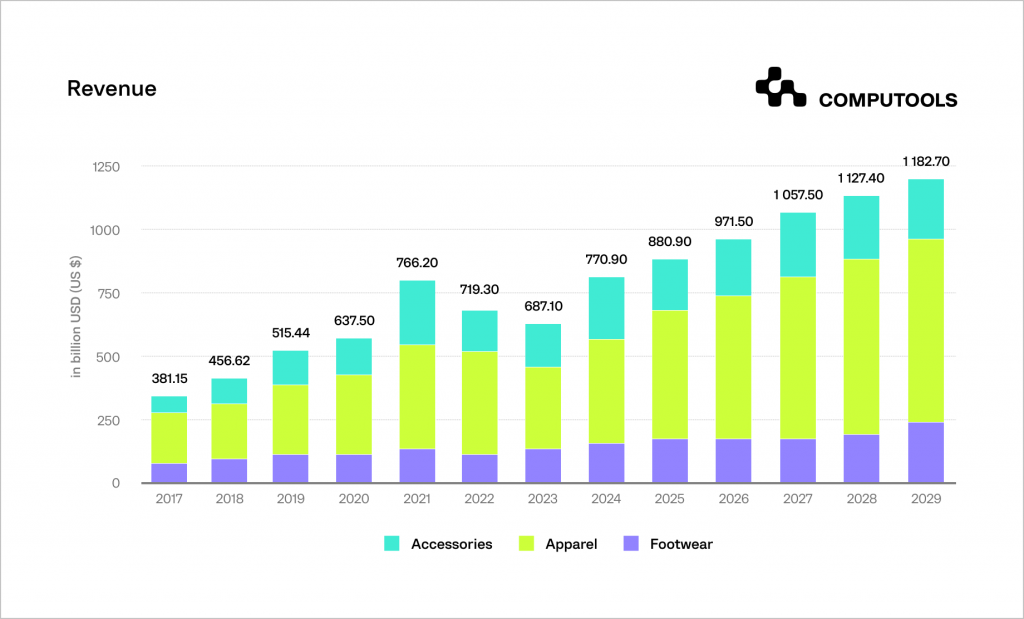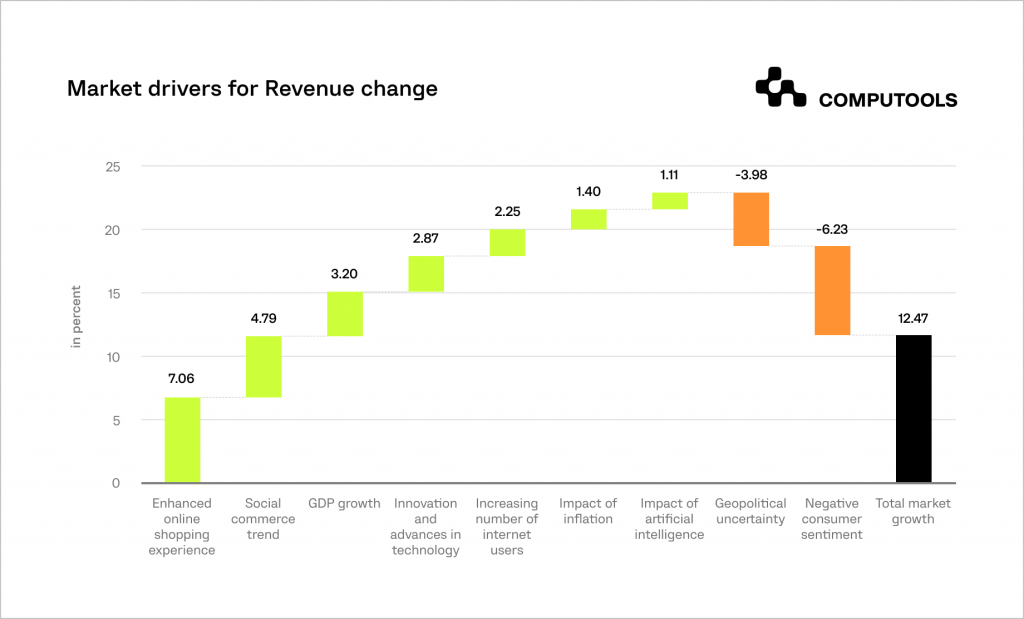Exploring the Growth of the Online Fashion Industry Through Innovation and AI
The primary emphasis of the eCommerce fashion market is selling apparel, shoes, and accessories online via digital platforms. The goal of eCommerce fashion is to offer customers an easy and accessible method of exploring and buying fashion items from a variety of brands, designers, and merchants.
The ability to provide a customised buying experience with features like virtual try-ons, style suggestions, and customer evaluations is what makes the eCommerce fashion business so relevant. Merchants and brands can reach a wider audience by engaging with consumers in a variety of demographic and geographic areas outside of physical storefronts.
Let’s take a look at the statistics on the industry’s revenue growth from year to year, which is provided by Statista, a statistical and analytical portal.
In the graph we can see that the sale of such articles as accessories, apparel and footwear was at its peak in 2021, a little sagged from 2022 to 2023, but in 2024 the revenue from online trade in fashion items exceeded the one that was at the peak, which gives us the opportunity to observe the upward trend in the future.
By 2029, the industry is on track to generate serious revenue of over $1.1 billion.

We also want to look at another interesting chart that shows us exactly what is driving the Fashion Industry market. Statista conducted a study which shows that one of the key drivers is innovation and technological advancement.
In particular, AI-based technologies such as online color matching and virtual fitting are significantly improving the online shopping experience, increasing convenience for users.
Another important driver is the increasing number of internet users, which directly contributes to e-commerce revenue growth by expanding the base of potential customers with digital skills.
In addition, the adoption of artificial intelligence has a significant impact, which is estimated to lead to a notable revenue growth in the industry owing to its active utilisation by e-сommerce companies.

Other than e-commerce, AI technology has just lately been widely available and is still afflicted with nagging quirks and problems, but all signs are that it will advance at breakneck pace and become a game changer in many parts of business.
According to McKinsey, generative AI may increase operational earnings in the garment, fashion, and luxury sectors by $150 billion to $275 billion over the next three to five years. From codesigning to speeding up content production processes, generative AI opens us new avenues for creativity.
It accepts all types of “unstructured” data—raw text, photos, and video—and produces new kinds of media, such as fully-written screenplays, 3D designs, and realistic virtual models for video campaigns.
In today’s article, we will do our best to explore exactly where and how to use AI in fashion.
4 Ways AI in Fashion is Shaping the Industry
Artificial intelligence is being employed in five major sectors of the fashion industry: product design, product lifecycle, supply chain management, marketing, and customer support.
1. Product Design
Artificial Intelligence is transforming product development across industries to deliver market-aligned products. It assists in:
AI Analysis for Fashion Industry
• AI collects and analyses data from social media, blogs, and e-commerce platforms.
• Machine Learning recognises patterns in styles, colors, and designs.
• Real-time monitoring of AI fashion trends provides instant insights, while predictive analytics forecasts future demand.
• AI tools offer insights by processing customer feedback, analysing market trends, integrating diverse data sources for comprehensive trend analysis.
Generative Design
• Generative AI helps designers explore a vast range of design possibilities and optimise products based on specific criteria like weight or material use.
• It enables rapid prototyping and iterative refinement.
• AI tools generate realistic visuals for fashion teams.
• AI creates digital artwork for clothing designs.
• It enhances photos and videos for marketing content.
Demand Forecasting
• AI analyses historical sales data and identifies complex patterns and relationships.
• Predictive analytics uses factors like seasonality and market trends to provide more accurate forecasts.
• AI platforms help brands forecast demand and manage inventory.
Sustainable Practices
• AI recommends eco-friendly materials and optimises energy consumption in manufacturing.
• It minimises waste through better resource utilisation.
• AI helps in designing more efficient, lightweight products.
2. Product Lifecycle
A systematic method for managing a product’s lifespan from original concept to retirement or disposal is called product lifecycle management, or PLM.
Here are key ways AI contributes to PLM:
• AI-powered Natural Language Processing tools improve communication among cross-functional teams.
• AI software solution for fashion industry assesses supplier performance, identifies risks, and optimises relationships.
• AI analyses historical and real-time sensor data to predict maintenance needs.
• PLM software integrates data across all phases, from design to manufacturing. AI-powered solutions streamline this data flow.
3. Supply Chain Management
AI enhances inventory management and logistics by utilising advanced algorithms and machine learning, improving accuracy, responsiveness, and cost-effectiveness. Integrating AI tools with existing systems creates a more adaptive supply chain.
Here are key ways AI development services optimise these processes:
• It analyses historical sales, market trends, and external factors to forecast demand, helping optimise inventory levels and reduce risks of stockouts or overstocking.
• AI systems adjust reorder points based on real-time demand fluctuations.
• AI predicts supplier lead times by analysing historical data.
• AI optimises logistics routes by factoring in traffic, delivery schedules, and costs.
• AI tools provide real-time tracking of inventory and logistics.
• AI-powered robots streamline warehouse tasks like picking, packing, and inventory tracking.
• AI analyses demand patterns and customer behavior to strategically allocate inventory across locations.
• AI evaluates supplier reliability and delivery times.
• AI enhances last-mile delivery by optimising routes and considering customer preferences.
• AI improves return management by analysing return patterns.
• AI predicts vehicle maintenance needs.
4. Marketing and Customer Service
Fashion and luxury software solutions enhance marketing and customer service for fashion brands by offering personalised experiences, automating routine tasks, and analysing large datasets for actionable insights.
Social Media and Content Management
• AI improves social media and influencer marketing by generating content, captions, and hashtags for social platforms.
• AI tracks brand mentions, relevant hashtags, and AI fashion trends to keep brands informed about customer sentiments.
• AI analyses data to identify emerging fashion trends for content alignment.
• AI tools optimise posting schedules to increase engagement.
• AI-powered bots engage users, answering queries and providing product info.
• AI ensures ads reach the most relevant audience, boosting conversions.
• AI tools track campaign metrics like engagement and conversion rates.
Virtual Try-On and Fitting
• AI software solutions enhance virtual try-ons by creating realistic, personalised experiences and analyse user images for accurate sising.
• Users can see clothing on digital avatars.
• AI simulates fabric draping for a realistic fit.
• AI suggests products based on user preferences.
• Virtual try-ons can be integrated across websites, apps, and social media.
Visual Search
• AI-powered visual search allows users to search for products via images.
• AI identifies visual elements for accurate product matching.
• Visual search enhances online shopping by helping users find similar items based on photos.
AI in Textiles Innovates for Our Sustainable Future
AI in fashion is making waves in the textile industry, not just by improving efficiency but by driving sustainable practices.
It helps companies reduce waste and discover eco-friendly materials, and it helps the industry move toward a greener and more responsible future just like this:
• Companies use AI to weave sensors into fabrics, creating “smart” materials that can adapt to changes in the environment or even interact with the wearer.
• By optimising the production process, AI cuts down on resource use and waste, making it easier to produce materials in an eco-friendly way.
• AI is helping identify and utilise eco-friendly materials, they have less of an impact on the environment, pushing the industry toward more sustainable options.
These advancements aren’t just about making better textiles, they’re about creating a more sustainable future. Companies that invest in AI software development services are at the forefront of this movement.
And if you’re wondering how to predict fashion trends, AI is playing a major role there too, helping brands stay ahead of the curve by analysing massive amounts of data to spot what’s coming next. Let’s discover all the possible benefits AI gives designers and fashion-related companies.
All the Benefits of AI in Fashion
At Computools, we’ve seen firsthand how AI is transforming every aspect of fashion, from product development to customer experience.
And we want to deepen into why AI is such a game-changer for fashion brands today:
1. Revenue Growth through Generative AI
By optimising processes and boosting creativity, this tech isn’t just a cost-saver—it’s a profit driver. Generative AI can help businesses design more personalised fashion items, streamline production, and forecast trends, leading to increased sales and a stronger competitive edge in the market.
2. Enhanced Product Development
Imagine having access to instant insights into what your customers truly want. AI analyses tons of data to spot trends and preferences, allowing your design teams to craft collections that are in sync with the market. It’s like having a crystal ball helping you avoid the costly mistake of launching products that don’t resonate with consumers.
3. Personalised Marketing Strategies
AI is the perfect tool to personalisation. AI-powered tools help you create highly targeted marketing campaigns by analysing your customers’ behavior, preferences, and past purchases. Brands that use personalisation see a significant revenue boost.
4. Optimised Customer Experience
From AI chatbots to virtual try-ons, AI is improving how customers shop and interact with your brand. No more long waiting time or guessing how an outfit will look — customers get quick, personalised assistance and can even “try on” items virtually. This leads to happier, more engaged customers who are likely to come back.
5. Streamlined Supply Chain Management
With AI managing your supply chain, you can predict demand more accurately, manage inventory better, and reduce waste. This means you can meet customer needs faster, avoid overstocking, and increase your profitability while keeping your operations lean and efficient.
6. Cost Reductions through AI Models
Forbes points out that AI-generated models are changing the game for fashion brands. You no longer need to invest in expensive photoshoots or model hiring. Instead, customisable digital models can showcase your collections, saving costs and representing your diverse customer base more inclusively.
7. Improved Forecasting and Trend Analysis
AI tools can help by offering advanced forecasting and AI prediction in fashion trends, giving you the insights needed to adapt your offerings quickly. By tapping into big data and machine learning, your brand can anticipate changes in the market and stay ahead of competitors.
8. Empowerment of Creative Teams
One of the greatest benefits of generative AI is that it enhances your creative teams rather than replacing them. It handles the data-heavy tasks, giving designers and marketers the freedom to focus on creativity and innovation. AI is a tool that empowers your team, allowing them to push boundaries and explore new ideas without being bogged down by routine processes.
By leveraging these powerful AI capabilities, fashion brands can not only overcome the challenges of 2024 but thrive. From boosting revenue and enhancing customer experiences to driving sustainability and empowering creativity, the benefits of AI in fashion are clear. Are you ready to embrace this digital transformation and lead the future of fashion?
Today, artificial intelligence offers unprecedented opportunities for the fashion industry. However, as with any new technology, there may be questions and skepticism. Some companies might still be unsure about how AI will fit into their business, fearing major changes or the complexity of integration. In reality, AI is a tool that makes your brand stronger and more successful.
Implementing AI requires an experienced and reliable partner capable of deeply understanding your business processes and offering comprehensive solutions. Companies that trust professionals for their digital transformation adapt more quickly to changing trends and gain a competitive edge.
Why Should You Turn to Computools?
If you’re considering integrating AI into your fashion business, our software development company offers a personalised approach and proven solutions already successfully implemented in this field.
Computools has extensive expertise in fashion industry, working with leading brands and helping them transform their operations, marketing, and customer interactions.
We assist our clients by:
• Assessing and understanding business needs
• Developing an AI strategy that enhances products and marketing
• Implementing cutting-edge tools to optimise processes
• Compelling examples of success
Don’t just take our word for it—check out our case studies and client reviews to see how we achieve real results for our clients.
One of our projects in the fashion industry demonstrated how AI can not only improve collection development processes but also significantly enhance supply chain efficiency and customer engagement.
At Computools, AI isn’t just a trendy technology — it’s an effective tool that delivers tangible business results.
Ready to revolutionise your fashion business with AI? Contact us at info@computools.com to discover how we can help you thrive in the digital era!
Computools
Software Solutions
Computools is an IT consulting and software development company that delivers innovative solutions to help businesses unlock tomorrow.









“Computools was selected through an RFP process. They were shortlisted and selected from between 5 other suppliers. Computools has worked thoroughly and timely to solve all security issues and launch as agreed. Their expertise is impressive.”